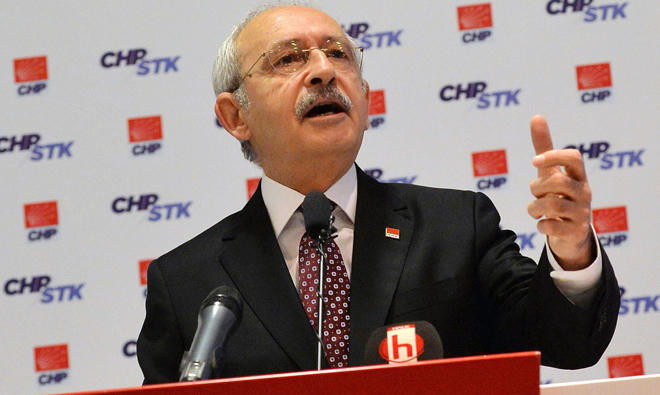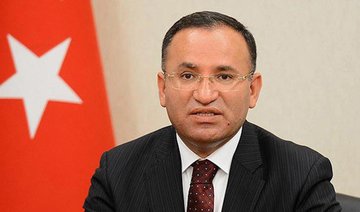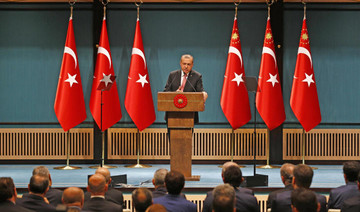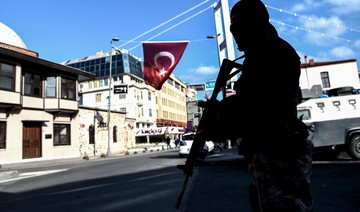ANKARA: Turkey is set to extend a state of emergency for the sixth time since it was imposed following failed 2016 coup attempt, worrying government opponents and allies who fear the special powers are thrusting Turkey toward an increasingly authoritarian direction.
The state of emergency, declared five days after the July 15, 2016 coup, has allowed a massive government crackdown aimed at suspected supporters of US-based Muslim cleric Fethullah Gulen, whom Turkey says was behind the coup attempt. Gulen denies any involvement.
The state of emergency has also paved the way for the arrest of other government opponents, including activists, journalists and politicians and the closure of media and non-governmental organizations over alleged links to extremist groups.
Most crucially, it has allowed President Recep Tayyip Erdogan to rule through decrees, often bypassing Parliament which he has long accused of slowing down his government’s ability to perform.
Among the more than 30 decrees issued since the coup, some have regulated the use of winter tires, obliged detainees accused of links to extremism to wear uniforms in court and gave full-employment rights to temporary workers. One vaguely-worded decree granting legal immunity to civilians who helped thwart the coup sparked an outcry and fears that it would encourage vigilante groups.
Kemal Kilicdaroglu, the leader of Turkey’s pro-secular main opposition party, this week accused Erdogan of taking advantage of the failed military coup to trample on democracy and lead a “civilian coup” of his own through his emergency powers.
“What have winter tires got to do with the state of emergency?” he asked.
“Through the decrees with the force of law, the government can now do whatever it pleases,” Kilicdaroglu said. “The constitution is of no importance. The government has obtained the power to carry out all unlawful arrangements.”
Turkey’s National Security Council is meeting Wednesday to recommend prolonging the state of emergency by a further three months, before the extension is due to be approved by the Council of Ministers later in the day and voted on in Parliament Thursday. Its current term expires on Jan. 19.
The government has defended its move to extend the emergency rule pointing to the severity of the coup attempt — during which rogue soldiers attacked Parliament and other state buildings leading to more than 250 deaths — and citing a continued security threat from Gulen’s network of supporters.
Erdogan has said the state of emergency will remain as long as security threats persist. Few believe that Erdogan will allow the emergency rule to end before a presidential election in 2019, when a set of constitutional amendments, narrowly approved in a referendum in April, come into effect, giving the president sweeping powers.
Observers say Erdogan is unlikely to take any step that would put a victory at the 2019 election at risk, including ending the state of emergency that has permitted authorities to ban public gatherings, which some say limited opposition parties’ ability to run effective campaigns during the referendum.
The EU, which Turkey once hoped to join, and the Council of Europe — the continent’s top human rights and democracy body — have expressed concerns over the state of emergency. The EU has called on Turkish authorities to respect the rule of law, human rights and fundamental freedoms.
The Council of Europe last year specifically criticized decrees that dismissed elected mayors and other municipal officials in Turkey’s mainly-Kurdish southeast over terror-related charges and the reappointment of unelected officials in their place.
The rights advocacy group, Freedom House, this week reduced Turkey’s status from a “Partly Free” country to “Not Free,” citing among other things, the replacement of elected mayors, and the arrests and purges of public sector workers for alleged links to Gulen. The group said the moves had left “citizens hesitant to express their views on sensitive topics.”
Under the state of emergency, Turkey has arrested around 50,000 people and purged 110,000 civil servants in a crackdown aimed at cleansing the state of Gulen’s followers.
Turkey set to extend state of emergency
Turkey set to extend state of emergency

NATO in talks to put nuclear weapons on standby, Stoltenberg tells UK’s Telegraph

- Jens Stoltenberg tells paper there are live consultations between members to use transparency around its nuclear arsenal as a deterrent
- ‘Transparency helps to communicate the direct message that we, of course, are a nuclear alliance’
Jens Stoltenberg told Britain’s Telegraph newspaper that there were live consultations between members to use transparency around its nuclear arsenal as a deterrent.
“I won’t go into operational details about how many nuclear warheads should be operational and which should be stored, but we need to consult on these issues. That’s exactly what we’re doing,” he told the paper.
“Transparency helps to communicate the direct message that we, of course, are a nuclear alliance.”
“NATO’s aim is, of course, a world without nuclear weapons, but as long as nuclear weapons exist, we will remain a nuclear alliance, because a world where Russia, China and North Korea have nuclear weapons, and NATO does not, is a more dangerous world.”
Stoltenberg said last week that nuclear weapons were NATO’s “ultimate security guarantee” and a means to preserve peace.
Russian President Vladimir Putin has repeatedly warned that Moscow could use nuclear weapons to defend itself in extreme circumstances. It accuses the US and its European allies of pushing the world to the brink of nuclear confrontation by giving Ukraine billions of dollars worth of weapons, some of which are being used against Russian territory.
NATO, which has taken on a greater role in coordinating arms supplies to Kyiv, rarely talks about weapons publicly, although it is known that the US has deployed nuclear bombs to several locations in Europe.
On Eid Al-Adha, animal accessories are all the rage

- Animal traders decorate bulls, lambs and goats to make them stand out and fetch higher prices
- Customers buy animals, then purchase anklets, bells and colorful collars from decoration stalls
ISLAMABAD: Ashraf Khan picked up a colorful anklet and showed it to a customer from a range of collars, beads, bells and other ornaments at his stall of animal accessories at the Sangjani cattle market on the outskirts of the Pakistani capital of Islamabad.
The 33-year-old, who sets up a makeshift stall at the market every year, said the demand for animal accessories went up just as the demand for animals and their prices surged ahead of the major Islamic festival, marked by devout Muslims by slaughtering animals and sharing the meat with family and the poor.
Khan, who has been selling animal accessories for the last several years, said his clients not only included members of the public, but also traders who wanted to adorn their cows, sheep and bulls before putting them up for sale in order to better attract customers and fetch higher prices.
“We receive goats, lambs and bulls [at our decoration stall],” Ashraf said. “It takes Rs1,000 to Rs1,500 ($3-5) to decorate a goat with different types of materials. Decorating bulls ranges from Rs2,000 to Rs2,500 ($7-8).”
The 33-year-old sources ornaments from Islamabad’s twin city of Rawalpindi and sets up his stall in the Sangjani capital market a week before Eid.
“The price tag depends on the number and quality of items,” Khan said.
Naik Muhammad, who brought 50 lambs to sell at Sangjani market, said a lamb cost him around Rs25,000 ($90) this year and he was looking to sell it for between Rs85,000 to Rs95,000 ($305-$341).
“The purpose of decoration is that customers like them more and the rates get better,” Muhammad said. “When customers like the animal then we can ask rates of our choice.”
Alamgir Khan, a fruit vendor in Islamabad, purchased a lamb for Rs77,500 ($278) after haggling with sellers for around three hours and brought it to Khan’s stall to buy accessories for decoration.
“We have spent some money on its decoration to make it look beautiful and then the children at home will see it and be happy, and that is a rewarding thing,” Alamgir told Arab News. “This is an animal for sacrifice, it should be adorned.”
Nicole Scherzinger shows off Lebanese gown at Tony Awards

DUBAI: US singer Nicole Scherzinger attended the 2024 Tony Awards in New York on Sunday in a gown by Lebanese designer Nicolas Jebran.
The pink-hued gown featured a sheer, embellished skirt, with rouching on the hips. Stylist Emily Evans finished off the look with -Cicada and Maison H jewelry.

Scherzinger — slated to star in a “Sunset Boulevard” revival on Broadway — sang the “In Memoriam” section, the Associated Press reported.
She sang “What I Did for Love” as the names of late Broadway heavyweights appeared, including playwright Christopher Durang and actors Alan Arkin,Glenda Jackson, Louis Gossett Jr., and Treat Williams.
“The Outsiders,” a gritty adaptation of the classic young adult novel, won the Tony Award for best new musical. The win meant Angelina Jolie, a producer, landed her first Tony, too.

“Stereophonic,” the play about a Fleetwood Mac-like band recording an album over a turbulent and life-changing year, won best new play and had the night's most total awards at five. It was written by David Adjmi, with songs by former Arcade Fire member Will Butler.
Two special guests electrified the crowd — Jay-Z and Hillary Rodham Clinton. The latter, a producer of a musical about suffragettes, presented “Suffs.”
“I have stood on a lot of stages, but this is very special,” Clinton said. “I know a little bit about how hard it is to make change.”
In the first musical presentation, Alicia Keys appeared at a piano as the cast of her semi-autobiographical musical, “Hell’s Kitchen,” presented a medley of songs. She sang her and Jay-Z’s 2009 smash “Empire State of Mind,” joining the rapper on interior steps to wild applause, according to the Associated Press.
Later, newcomer Maleah Joi Moon won best leading actress for “Hell's Kitchen,” brushing aside a challenge from veteran Kelli O’Hara. The 21-year-old, who plays a role loosely based on Keys’ life, dedicated her award to her parents.
Jeremy Strong took home the first big award of the night. The “Succession” star landed his first Tony for his work in the revival of Henrik Ibsen’s 1882 political play “An Enemy of the People.”
“Harry Potter” star Daniel Radcliffe cemented his stage career pivot by winning featured actor in a musical, his first trophy in five Broadway shows. He won for the revival of “Merrily We Roll Along,” the Stephen Sondheim- George Furth musical that goes backward in time.
Pakistan among big nuclear arms spenders amid swelling global tensions — studies

- Spending for 2023 by the nuclear-armed states jumped more than 33 percent from the $68.2 billion spent in 2018
- SIPRI says “we have not seen nuclear weapons playing such a prominent role in international relations since Cold War”
GENEVA: Nuclear-armed countries hiked spending on atomic weapons arsenals by a third in the past five years as they modernized their stockpiles amid growing geopolitical tensions, two reports showed on Monday.
The world’s nine nuclear-armed states jointly spent $91 billion on their arsenals last year, according to a new report from the International Campaign to Abolish Nuclear Weapons (ICAN).
That report, and a separate one from the Stockholm International Peace Research Institute (SIPRI), indicated that nuclear weapons states are dramatically scaling up spending as they modernize and even deploy new nuclear-armed weapons.
“I think it is fair to say there is a nuclear arms race under way,” ICAN chief Melissa Parke told AFP.
Wilfred Wan, head of SIPRI’s weapons of mass destruction program, meanwhile warned in a statement that “we have not seen nuclear weapons playing such a prominent role in international relations since the Cold War.”
SIPRI’s report showed that the total estimated number of nuclear warheads in the world actually declined somewhat to 12,121 at the start of this year, from 12,512 a year earlier.
But while some of that included older warheads scheduled to be dismantled, it said 9,585 were in stockpiles for potential use — nine more than a year earlier.
And 2,100 were kept in a state of “high operational alert” on ballistic missiles.
Nearly all of those were held by the United States and Russia, but China was for the first time believed to also have some warheads on high operational alert, SIPRI said.
“While the global total of nuclear warheads continues to fall as Cold War-era weapons are gradually dismantled, regrettably we continue to see year-on-year increases in the number of operational nuclear warheads,” SIPRI director Dan Smith said.
The spending surge reported by ICAN appeared to back that up.
The report showed that in 2023 alone, nuclear weapons spending worldwide jumped by $10.8 billion from a year earlier, with the United States accounting for 80 percent of that increase.
The US share of total spending, $51.5 billion, “is more than all the other nuclear-armed countries put together,” said ICAN.
The next biggest spender was China, at $11.8 billion, followed by Russia, spending $8.3 billion.
Britain’s spending meanwhile rose significantly for the second year in a row, swelling 17 percent to $8.1 billion.
Spending for 2023 by the nuclear-armed states — which also include France, India, Israel, Pakistan and North Korea — jumped more than 33 percent from the $68.2 billion spent in 2018, when ICAN first began collecting this data, it said.
Since then, the nuclear armed states have spent an estimated total of $387 billion on the deadly weapons, the report showed.
Parke slammed “the billions of dollars being squandered on nuclear weapons” as “a profound and unacceptable misallocation of public funds.”
She highlighted that that money was more than what the World Food Programme estimates is needed to end world hunger.
“And you could plant a million trees for every minute of nuclear weapons spending,” she said.
“These numbers are obscene, and it is money that the state says is going toward weapons that... will never be used,” she said, pointing to the nuclear deterrence doctrine.
The investments are not only wasteful but also extremely dangerous, she warned.
“What happens when deterrence fails?“
Geneva-based ICAN won the 2017 Nobel Peace Prize for its key role in drafting the Treaty on the Prohibition of Nuclear Weapons, which took effect in 2021.
Seventy countries have ratified it to date and more have signed it, although none of the nuclear weapons states have come on board.
“Instead of investing in Armageddon, the nine nuclear-armed states should follow the example of almost half the world’s countries and join the treaty... and make a real contribution to global security,” said Alicia Sanders-Zakre, a co-author of Monday’s ICAN report.
Afghan Taliban govt says to attend next round of UN talks in Doha

- Taliban government were not included in first set of talks, refused invitation to second round in February
- The talks in Doha are scheduled for June 30 and July 1 and have already been criticized by women’s groups
KABUL: Taliban authorities will attend the third round of United Nations-hosted talks on Afghanistan in the Qatri capital, a government spokesman said on Sunday, after snubbing an invitation to the previous round.
The Taliban government’s participation in the conference of foreign special envoys to Afghanistan had been in doubt after it was not included in the first set of talks and then refused an invitation to the second round in February.
“A delegation of the Islamic Emirate will participate in the coming Doha conference. They will represent Afghanistan there and express Afghanistan’s position,” Zabihullah Mujahid told AFP.
The talks in Doha are scheduled for June 30 and July 1, and have already been criticized by women’s groups.
Mujahid told Afghan media on Sunday that a delegation — yet to be announced — would attend because the talks’ agenda appeared “beneficial to Afghanistan.”
The agenda includes “topics such as aid for Afghanistan and creating opportunities for investors in Afghanistan, which are important,” he said.
However, foreign ministry spokesman Abdul Qahar Balkhi warned in a post on social media site X later on Sunday that “if there are any changes to the agenda and participation, it would naturally affect our decision” to attend.
Launched by the UN Secretary-General Antonio Guterres in May 2023, the series of talks aim to “increase international engagement with Afghanistan in a more coherent, coordinated and structured manner,” according to the UN.
Civil society groups that included women were invited to the February talks but the Taliban government refused to participate unless its members could be the sole representatives of Afghanistan.
It also requested to meet Guterres, who at the time said the set of conditions to participate “were not acceptable.”
In recent weeks, multiple UN representatives and international envoys have held meetings with the Taliban government on the next Doha talks, which Guterres will not attend.
Diplomatic sources told AFP there were plans to consult with Afghan civil society groups before and after the next talks, but that they would not take part in meetings that include the Taliban authorities.
The sources said the official meetings were due to cover finance and economic issues, as well as counternarcotics efforts.
Several civil society groups have urged the UN to prioritize women’s rights and include Afghan women.
“The world must provide platforms for the people and women of Afghanistan to discuss the future of their country,” Afghan women’s rights activist Hoda Khamosh, now based in Norway, told AFP.
“Still, they are not heard because the world is interacting anyway with the Taliban, even if they say they do not recognize them.”
The international community has wrestled with its approach to the Taliban government since it returned to power in 2021, still not officially recognized by any other state.
The Taliban government has imposed a strict interpretation of Islam, with women subjected to laws characterised by the UN as “gender apartheid.”
Human Rights Watch’s Associate Women’s Rights Director, Heather Barr, said the Taliban should not have been allowed to make demands on the conditions of the meetings considering their policies targeting women.
“It is unthinkable that diplomats could gather to discuss Afghanistan in the middle of such a crisis and do so without women’s rights being the main issue on the agenda and Afghan women being full participants in the discussion,” she told AFP.
Under-Secretary-General for Political and Peacebuilding Affairs, Rosemary DiCarlo, extended Taliban Foreign Minister Amir Khan Muttaqi an advance invitation to the talks during a visit to Afghanistan in May, a statement said.
A key element of the talks held in the Gulf state, which hosted the Taliban during years of peace talks with the United States, is a UN independent assessment on Afghanistan released late last year.
The assessment, backed by Western nations, suggested recognition of the Taliban authorities be tied to the removal of restraints on women’s rights and access to education.
It also recommends the appointment of a UN special envoy, which the Taliban government has rejected.












